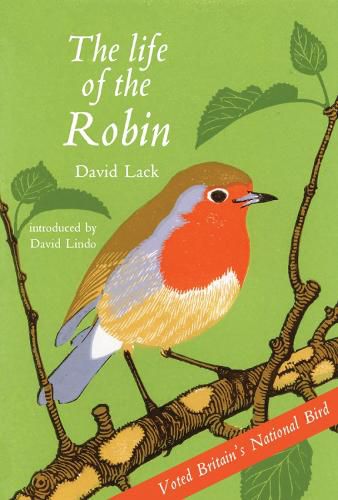Readings Newsletter
Become a Readings Member to make your shopping experience even easier.
Sign in or sign up for free!
You’re not far away from qualifying for FREE standard shipping within Australia
You’ve qualified for FREE standard shipping within Australia
The cart is loading…






The Robin has now been voted Britain’s favourite bird - a friendly presence in thousands of gardens, year round. Its life was hardly understood when David Lack - who has been called Britain’s most influential ornithologists - started his scientific observations of robins while a schoolteacher at Dartington. It was Lack who established that robins sing to defend their territory; that males will fight to the death but will also feed injured opponents; that couples will court and mate but then ignore each other; that most robins will die in any given year. The book he wrote is a landmark in natural history, not just for discoveries that changed ornithology, but because of the approachable style, sharpened with an acute wit. It reads as freshly, and as fascinatingly today, as when it was written. No one who has ever enjoyed the company of a robin in their garden or on a walk will want to be without this book. Unavailable for many years, this classic work is introduced by the doyen of robin studies today, David Harper. A preface by Peter Lack explains the genesis of the book, and its place in the hugely important lifetime’s work carried out by his father.
$9.00 standard shipping within Australia
FREE standard shipping within Australia for orders over $100.00
Express & International shipping calculated at checkout
The Robin has now been voted Britain’s favourite bird - a friendly presence in thousands of gardens, year round. Its life was hardly understood when David Lack - who has been called Britain’s most influential ornithologists - started his scientific observations of robins while a schoolteacher at Dartington. It was Lack who established that robins sing to defend their territory; that males will fight to the death but will also feed injured opponents; that couples will court and mate but then ignore each other; that most robins will die in any given year. The book he wrote is a landmark in natural history, not just for discoveries that changed ornithology, but because of the approachable style, sharpened with an acute wit. It reads as freshly, and as fascinatingly today, as when it was written. No one who has ever enjoyed the company of a robin in their garden or on a walk will want to be without this book. Unavailable for many years, this classic work is introduced by the doyen of robin studies today, David Harper. A preface by Peter Lack explains the genesis of the book, and its place in the hugely important lifetime’s work carried out by his father.